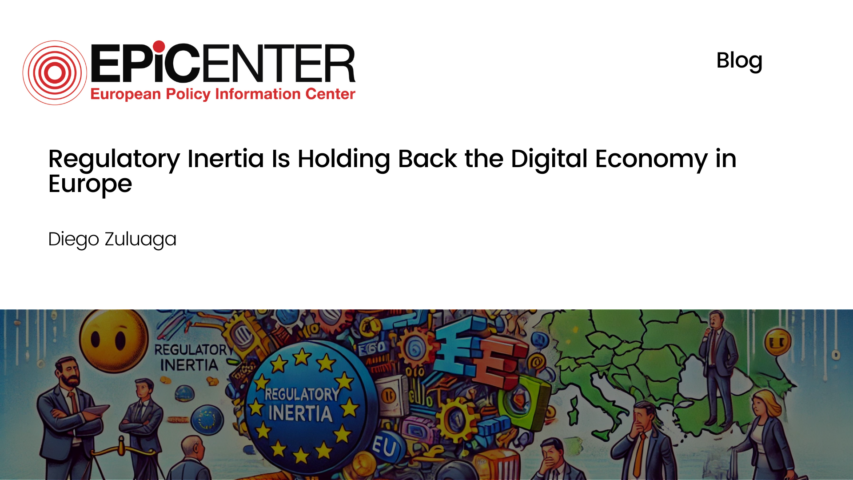Regulatory Inertia Is Holding Back the Digital Economy in Europe

Regulatory Inertia Is Holding Back the Digital Economy in Europe
Diego Zuluaga // 23.03.2016
It is a cliché to observe that digital technology is changing the way we work and interact with each other. But technological innovation also has profound implications for legislation and the way in which public authorities regulate the economy. Yet, it does not seem that policymakers have fully embraced the change wrought by innovative industries. On the contrary, they continue to apply models and theories from the pre-digital age to digital businesses, with potentially quite harmful consequences for future innovation and economic prosperity.
Consider online platforms, i.e. digital businesses which connect interdependent users and make previously impossible transactions feasible. According to the definition used by the European Commission, which is wider than the one employed by economists, online platforms include search engines, e-commerce firms, sharing economy providers, and others. The Commission is considering a special regulatory framework for these businesses, as it is worried about their market power and ability to exclude competitors and firms and individuals using their services.
This regulatory drive has been driven by complaints from industry incumbents and allegations of abuse of dominance in the media, but it has yet to be substantiated with economic evidence. Digital markets are by all available accounts highly competitive, with an increasing number of players providing an ever-widening set of services, mostly at zero or very low money and time cost to consumers. Furthermore, it is questionable whether it would be wise to bring hundreds – maybe thousands – of firms operating in very many different sectors under the same regulatory umbrella – especially when the definition of businesses covered by the umbrella has been given by the very body designing the legislation!
Moreover, the economic case for regulation is most often based on theories developed for utilities, where cost structures made monopolistic provision optimal and therefore public regulation justified to ensure competitors were treated fairly. While it is easy enough to use the language employed in the utility sector (“essential facilities,” “duty to deal,” and so on), there are clear economic differences between utilities and digital firms. Importantly, there is no reason to believe that a similar impetus towards monopoly is present in the digital industries. Even if network effects make scale an important benefit, the potential for disruption and technical improvements by competitors appears – as far as one can tell from the evidence we see around us – to more than offset such effects.
A similar inability for many public officials to come to terms with technological innovation is present in the case of the sharing economy. To be fair to the European Commission, it has been trying to work with Member States to come up with a new approach that will harness the expanded business opportunities and flexible employment made possible by sharing economy firms. But national governments and parliaments in many EU countries have so far been unwilling to consider the legislative changes to labour-market rules and market entry which would maximise the benefits of these new business models. Often, inertia has prevailed despite the advice of regulators themselves, as in the case of Spain.
A blog post cannot do justice to the many ways in which a status quo bias is making itself felt on digital and competition policy across Europe. However, it is important to recognise the following: Digital innovations are likely not just to shift consumption and work patterns – mostly for the better – but they will also change the way in which businesses compete with one another. More and more, tech firms are competing to create environments – those in the digital sector call them ‘ecosystems’ – in which individual operators can do business. These individual operators include app developers, advertising firms, media outlets, retailers, and even individuals offering up their flat for temporary accommodation.
The ecosystems include Uber, Amazon, Google’s Android, Apple’s iOS, Microsoft and a growing number of smaller players. While it may seem that these ecosystems could play a monopolistic role with regard to the businesses and individuals using them, there is in fact fierce competition between ecosystems, in a way that benefits their users and ensures anti-competitive practices cannot last long. Furthermore, such platform competition can be expected to progressively lead to better and cheaper ways of doing business, connecting with people, and making the most of one’s talents and abilities. Competition will also lead to quality standards that are closer and more responsive to the demands of consumers.
The digital age is an exciting time for those of us who believe that the choice and variety enabled by innovation, combined with economic incentives, can drastically improve well-being in the coming decades. But in order to take advantage of the change to come, legislators’ and regulators’ outlook must change with it.
EPICENTER publications and contributions from our member think tanks are designed to promote the discussion of economic issues and the role of markets in solving economic and social problems. As with all EPICENTER publications, the views expressed here are those of the author and not EPICENTER or its member think tanks (which have no corporate view).



